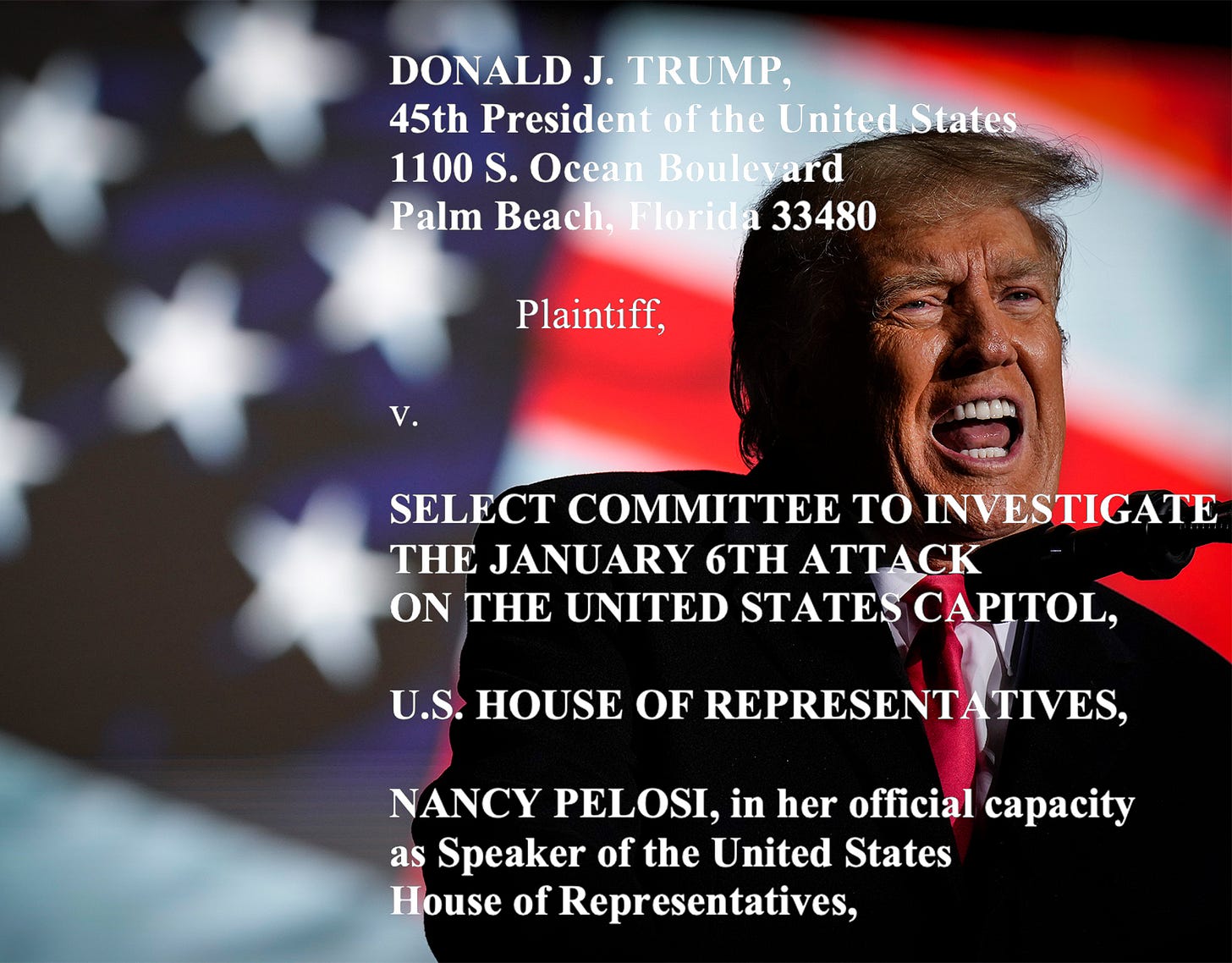Trump’s Case Against Responding to Congress’s Subpoena
How far does presidential “absolute immunity” extend?
On Friday, former President Donald Trump sued the House January 6th Committee in federal court in Florida. He is asking for an order halting the committee’s subpoena for relevant documents and for his testimony, which, as he describes it, would be taken “in a closed-door deposition about events that occurred while he was President of the United States.” According to the subpoena the committee issued Trump last month, those events amounted to a “multi-part effort to overturn the 2020 presidential election and to obstruct the peaceful transition of power.”
Trump offers a slew of justifications for killing the subpoena, only one of which really resonates. Yet that argument has nothing to do with Trump himself—who has, as usual, created a constitutional conundrum out of his own lawlessness. Rather, it has to do with whether it’s a good idea to greenlight congressional investigations into former presidents in general. If Trump is a one-off as far as presidents go, then restraining the Jan. 6th Committee makes sense. But if what Trump did was so terrifyingly serious that it warrants prevention at all costs, then empowering the legislative branch to investigate and shore up the boundaries of presidential power may be worth the potential political harassment future chief executives might have to endure.
The Jan. 6th Committee is aware that it’s walking a thin line here. In its letter to Trump enclosing the subpoena, it wrote:
We recognize that a subpoena to a former President is a significant and historic action. We do not take this action lightly. But as you likely know, you would not be the first former president to testify before Congress or to receive a congressional subpoena. Former Presidents John Quincy Adams, John Tyler, Theodore Roosevelt, William Howard Taft, Herbert Hoover, Harry Truman, and Gerald Ford each testified before Congress after they left office. . . . Even sitting Presidents, including Abraham Lincoln . . . testified before Congress.
Of course, one glaring difference between Trump and these predecessors is his unabashed, gangster-like approach to the rule of law. The Jan. 6th insurrection was but one, culminating example. As the committee notes in its letter, Teddy Roosevelt felt compelled to testify because he believed “an ex-President is merely a citizen of the United States, like any other citizen, and it is his plain duty to try to help this committee or respond to its invitation.” Trump despised and assailed the very people who answered to him as head of the executive branch. Having impeached him twice, Congress is a far darker adversary in Trump’s malevolent mind.
Prior presidents are not the best comparison for the additional reason that they were not responsible for the kinds of abuse that Trump brought to the Oval Office. Asked by PBS’s Judy Woodruff to compare Trump to Richard Nixon, who resigned office rather than face impeachment, veteran Washington Post reporter Carl Bernstein explained:
It’s very important to understand the progression from Richard Nixon’s criminality to Donald Trump’s criminality. They are both criminal presidents of the United States. But then Trump went further. He is the first seditious president in our history. How did that happen? He decided he would not abide by the election, the duly constituted, free election of Joe Biden as the president of the United States, and staged a coup to keep Biden from taking office.
Trump argues in his lawsuit that, just as sitting presidents cannot be sued for official actions taken in office, they enjoy “absolute immunity” from being forced to testify before Congress, else they feel chastened in their ability to execute their duties under Article II of the Constitution. But the Supreme Court held in 2020 in Trump v. Mazars that absolute immunity did not protect Trump’s banks and accounting firm from having to respond to congressional subpoenas for his financial information while he was president. And as Trump basically admits, nobody is concerned about his ability to exercise discretion as president anymore, because he is no longer president. (Whew.)
Nonetheless, the Court emphasized that a congressional subpoena of a president—any president—inevitably creates an “interbranch conflict” with serious separation-of-powers implications. “Were it otherwise,” Chief Justice John Roberts wrote for the majority (over the dissent of Justices Clarence Thomas and Samuel Alito), “Congress could declare open season on the President’s information held by schools, archives, internet service providers, e-mail clients, and financial institutions.” If this new case arising out of the Jan. 6th Committee’s subpoena reaches the Supreme Court, all nine justices would be hard-pressed to ignore the tension between ensuring accountability for presidential wrongdoing through legislation on one hand, and the need for executive independence from Congress on the other.
Although Trump’s lawyers did a competent job this round, the true test of his immunity theory could come later, if prosecutors seek his grand jury testimony, as they did with President Bill Clinton in the Monica Lewinsky probe (he willingly complied). In 1974, a unanimous Supreme Court in United States v. Nixon held that a sitting president cannot shield himself from producing evidence in a criminal prosecution, as “neither the doctrine of separation of powers nor the generalized need for confidentiality of high-level communications, without more, can sustain an absolute, unqualified Presidential privilege of immunity from judicial process under all circumstances.” Trump’s lawyers supportively argue that Congress may not issue a subpoena for the purpose of law enforcement, because “those powers are assigned under our Constitution to the Executive and the Judiciary.”
Trump should be careful what he’s wished for. Attorney General Merrick Garland is far from finished.



